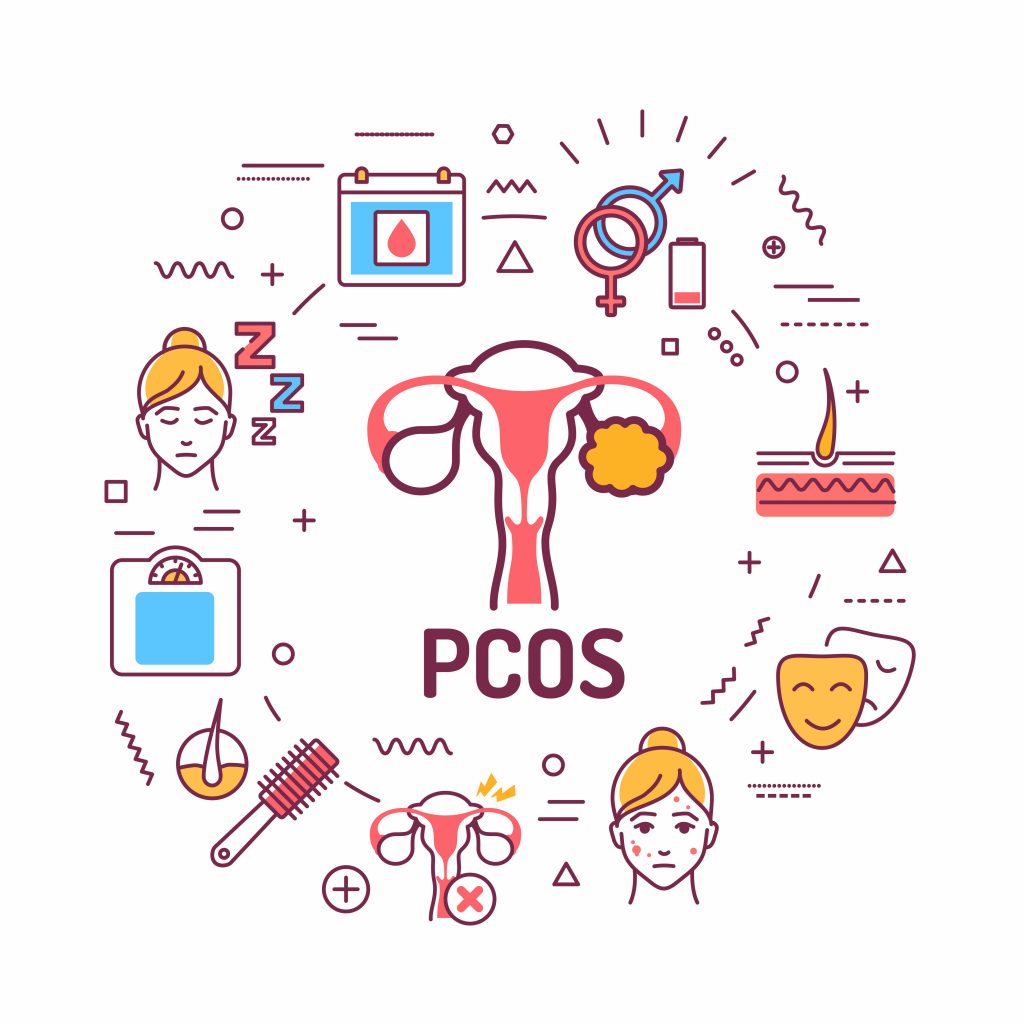
Polycystic ovarian syndrome (commonly referred to as PCOS) is an ovulation disorder that impacts roughly 1 in 10 reproductive age women. The disorder is characterized by infrequent periods, elevated androgens and a multi cystic appearance of the ovaries on ultrasound.
To understand PCOS, you first have to understand the normal menstrual cycle. From the first day of your period, your ovary should begin recruiting an egg within a follicle to prepare it for ovulation. This process involves the ovary producing high levels of estrogen. After about two weeks, the follicle is mature and your brain sends out a signal to release the egg. After egg release, estrogen levels fall and the empty follicle (called a corpus luteum) produces high levels of progesterone. If the egg is not fertilized by sperm, the empty follicle reabsorbs and progesterone levels fall. When progesterone drops, this signals your uterus that it is time for a period, and bleeding begins.
In PCOS, instead of producing one mature follicle each month, the ovary recruits numerous follicles (which can give it that classic polycystic appearance on ultrasound). This leads to abnormal estrogen signaling and absence of organized, cyclic ovulation.
This abnormal hormonal environment leads to a range of symptoms that can vary from woman to woman. Because the symptoms of PCOS can be quite diverse, it’s often challenging to diagnose. Some common signs and symptoms include:
- Irregular Periods: If your menstrual cycles are all over the place, either coming too often or too infrequently, it might be a red flag for PCOS.
- Excess Androgens: Androgens are male hormones that women produce too, but an excess can lead to cystic acne, male pattern hair growth (hirsutism), and even hair loss.
- Ovarian Cysts: These cysts can vary in size and may be detected during a pelvic exam or an ultrasound.
- Fertility Issues: Because PCOS can interfere with ovulation, it can make it difficult for some women to conceive.
One crucial aspect of PCOS is its connection to insulin resistance. Insulin is a hormone that regulates blood sugar levels, but some women with PCOS are less sensitive to insulin’s effects. This can lead to higher insulin levels, which in turn can stimulate the ovaries to produce more androgens, worsening PCOS symptoms.
It’s essential to manage insulin resistance, not only to improve PCOS symptoms but also to reduce the risk of developing type 2 diabetes later in life. Lifestyle changes like diet and exercise can be highly effective in improving insulin sensitivity and other problems associated with PCOS. If insulin resistance has led to pre-diabetes or diabetes, diabetes medications can be a part of your PCOS treatment plan.
Dealing with PCOS can be challenging, but you are not alone, and there are multiple ways to manage and improve symptoms.
- Healthy Eating: Adopting a balanced diet can improve multiple PCOS symptoms. Focus on eating more whole foods, fruits, vegetables, and whole grains. Limit processed foods, sugars, and unhealthy fats.
- Regular Exercise: Incorporate physical activity into your routine. Exercise not only helps with weight management and insulin resistance, but also promotes overall well-being.
- Supplements: In addition to healthy diet and exercise, supplements can help with insulin sensitization. Myo- and D-chiro-inositol supplements have been shown to improve insulin resistance, PCOS symptoms, and reproductive outcomes among women with PCOS.
- Hormonal Birth Control: Birth control pills can address period abnormalities and reduce androgen levels, which may help with acne and hirsutism.
- Fertility Treatments: If you’re planning to conceive, there are medications and treatments available to stimulate ovulation.
Living with PCOS can be emotionally challenging, especially when dealing with fertility challenges. Don’t be afraid to seek support and guidance. Joining support groups, either online or in person, can connect you with other women going through similar experiences. Please reach out to a medical professional if you have PCOS and need help managing symptoms, or if you suspect you may have this disorder and would like a workup. Your women’s healthcare provider can discuss your unique situation and offer personalized advice, testing, and treatment.

















